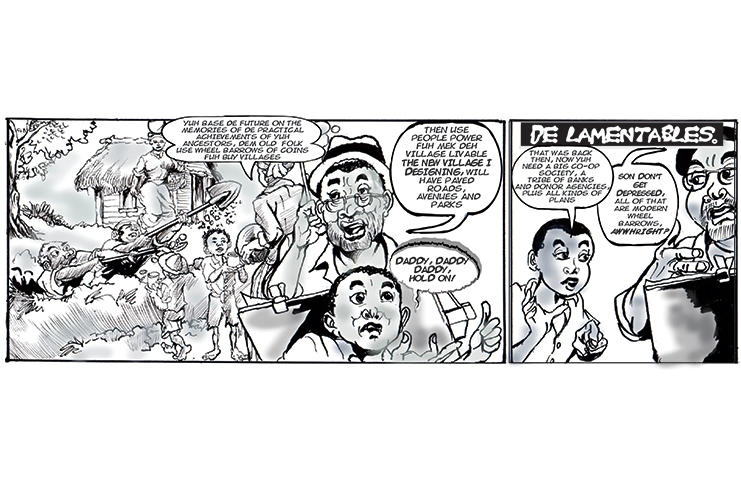THE SCI-FI series Star Trek was a leader in applying straight science with poetic licence added of course to its dramas that took screen and comics, their communicator at that time a fictional Sci-fi item heralded the cell phone, the MOTOROLA inventor Martin Cooper admitted this. I started in the late 80s to explore the science I needed for projects, some of which I have not yet published. But it was an article in the April 2011 edition of the science magazine DISCOVER, that opened a portal to a vast awareness and perception on the question of the importance of personal and collective history.
The article expounded on the usage of the episodic memory (which allows us to reflect on what was, to enable the analyst of the present to empower us with the references to plan for the future). Injury to the hippocampus (a part of the vertebrate brain in advanced mammals believed to be responsible for forming new memories) has demonstrated in the case studies used in the article to eliminate any capacity for simple, rational planning of tomorrow and even the next few hours. In a follow-up article of ‘A Discover Magazine Special’ Fall-September 2012, the author Carl Zimmer captured the nexus between memory and future: “We rely upon our memories to envision the future. Through the trick of mental time travel, we picture yesterday and imagine tomorrow.”
Through our neglect of managing the foundations of what worked in our interest before, not that foundations are not adjusted and redressed but the prototypes always remain obvious, we have opened the doors to mimicry in too many areas causing fragmentation between generations, with individuals and the loss of the episodic memory. Our DJs think that to sound good they must mimic our Jamaican cousins. A few speak like Americans and they have hardly visited Timehri. The passion to imitate ricochet from the wall of emptiness where mental time travel should have absorbed the imitative crave. As a child, I saw ‘Johnny Braff’ perform. He wore a suit like every American performer that came to our shores back then, up to when I turned a teenager and saw King Floyd at Globe Cinema the early 70s, but Johnny Braff’s lyrics and mood were Guyanese to the bone. The Yoruba Singers took our expression to another level. Recently MP John Adams recommended through a parliamentary committee that schools should sell healthy products and not soft drinks etc. That is the tip of the anaconda’s tail. If you talk to school children, many young children have lost the memory of ‘Rounders’, Salt-pass, Mend the Water Works and other mental and physical reflex challenging children games, so they’re open to any foreign cultural norm imported regardless of how twisted and demeaning its content is in the absence of a local challenge.
Freddie Kissoon on August 31 stated that Guyana has one of the poorest journalistic communities in the world, they research nothing and practice no journalistic investigation, and of course, he’s right. But it goes further than that; the references of self were evidently absent in the schools longer than that. Its emergence started in the late 80s with the bubble sessions, that replaced the initial intention of GBC’s ‘Folk Festival’ and teachers in many schools, at least in Georgetown became too lazy to organise a proper cultural programme for graduation and end of term and were duplicating the ‘Big Set’ sessions that feted the traders by the Beacon spot by the Plaisance car park and elsewhere else. After the 80s into the Jagdeo/Roger Khan era, all hit rock bottom, there was a TV station that showed imported videos 24/7. That period systematically destroyed two generations, wiped out anything Guyanese, and we have not begun to do the repairs as yet. To give an example of how the eraser of the episodic memory works I’ll take you to a conference hosted by ACDA in 2010 or 2011. I sat at a workgroup that demanded an audience of the question of whether the Bible was responsible for the enslavement of Africans and whether a movement should be made to repress it. Ras Dalgety, Harry Batiste and a few others were stern advocates since I once entertained that idea in my early teens and was guided by obvious evidence that I was blind to and was diligently made aware of. I invoked and advocated the same in 2010.
Fact-1: I asked the workgroup to identify a European River mentioned in the Bible? There was none. Next, I asked for a European kingdom nation that resided in the Biblical geography? Someone eagerly pounced at me with Persia. I asked if the group had heard of Elam. Shoulders negatively shrugged. This was the African kingdom that was at war with Babylon when the nomadic Aryan tribes came and found sanctuary with the Elamites. They fused and became Persia- today’s Iran. It had the same effect that it had on me so many years before.
The Biblical and all ancient episodic memories of enslaved Africans were erased through the propaganda of Art posters and movies and the obvious was shrouded by a veil of disbelief, enough entertain the old Creole proverb ‘to throughout de baby wid de bathwater’. Our concept of origins revolved around slavery that liberated us from darkest Africa and fulfilled a concocted biblical curse. Africans were not the first to experience this conquest of memory loss. The fact today is that it’s not the remote landscape, but the more recent value system of applying life skills that were repressed into ‘Time travel loss’ and to embrace the future, we have got to connect the fragments.













